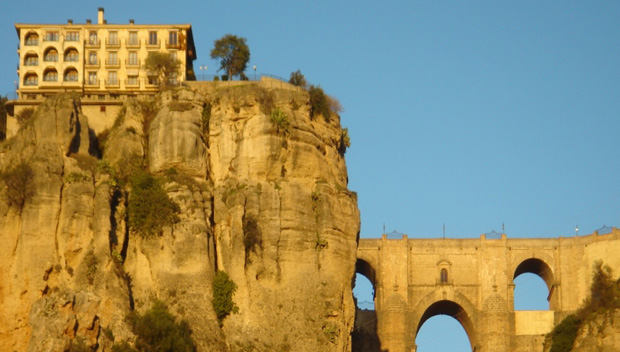
The beautiful Parador hotel in Ronda, Málaga
Every country has their own unyielding institutions. The kinds of cultural kinks that stay the same year-on-year, resistant to modernisation and seemingly immune from external pressures on their image or finances.
For the Brits, it’s the Monarchy. Despite repeated claims that they are getting more in touch with the common man, the British Royal Family remains steadfastly aloof; a symbol of past glories and – for some – a reassuring bulwark against change.
In Spain, the same could be said for the country’s legendary Parador hotels…
These government-owned institutions are a symbol of Spain’s gloriously rich and often bloody past. Nearly all of the 93 Paradors in Spain are located in refurbished castles, forts and monasteries. They are all hauntingly beautiful, luxurious and brilliantly located.
They are also unprofitable. In 2012, the Parador chain posted losses of €28 million, which comes on top of a total debt of €105 million. At a time when the economic crisis is forcing millions of Spaniards to forego foreign holidays and retreat into the comforting embrace of tradition, the Parador hotels should be full to bursting every week.
But they are not, and the reasons are obvious – they have failed to bend to the ways of the market. Sure, they offer authenticity and tradition, and their cleanliness and location cannot ever be faulted. Their failings are more nuanced, and an indictment of the perils of being government-owned in a market that relies on fleet-footedness, and a desire to stay cutting-edge.
Tourism experts in Spain all agree that the Paradors have been indifferent to modern booking methods, arrogantly assuming that they didn’t have to change. Their online presence is minimal and clunky, and their relationship with tour operators is often strained. They have refused to admit that they need help or assistance, stubbornly believing that their high standards for food, décor and history would be enough.
In this day and age, it isn’t. Their often monolingual staff puts off foreign tourists, and millions of Spaniards who cannot afford to head overseas for a holiday require more than a pristine bedroom in a 12th century turret – they want smiling service, affordability, flexibility and fun. They want to escape from Spain’s weight of history for a few days, rather than wallow in it.
But things are changing, slowly. In what could be seen as a microcosm of the country’s own turmoil, the Paradors are readdressing their employment terms (introducing the notion of seasonal staff – something incredibly ignored by Paradors in their entire history), offering new package deals and looking to appeal to a wider audience.
Hopefully, these changes will have the desired effect. It is admirable that the Parador chain has tried to stick true to its origins. There is a great deal of comfort in knowing that, in this fast-paced world of ours, you can still take a step back in time and relax in historic surroundings.
But market pressures are market pressures, and change they must. Here’s hoping it will be a change for the better.
 en
en



 Vlaams-Nederlands
Vlaams-Nederlands
0 Comments
Leave a Comment
DISCLAIMER
The opinions and comments expressed by contributors to this Blog are theirs alone and do not necessarily reflect the views of VIVA Homes Under the Sun Ltd, any of its associated companies, or employees; nor is VIVA to be held responsible or accountable for the accuracy of any of the information supplied.
Have you got something to say?